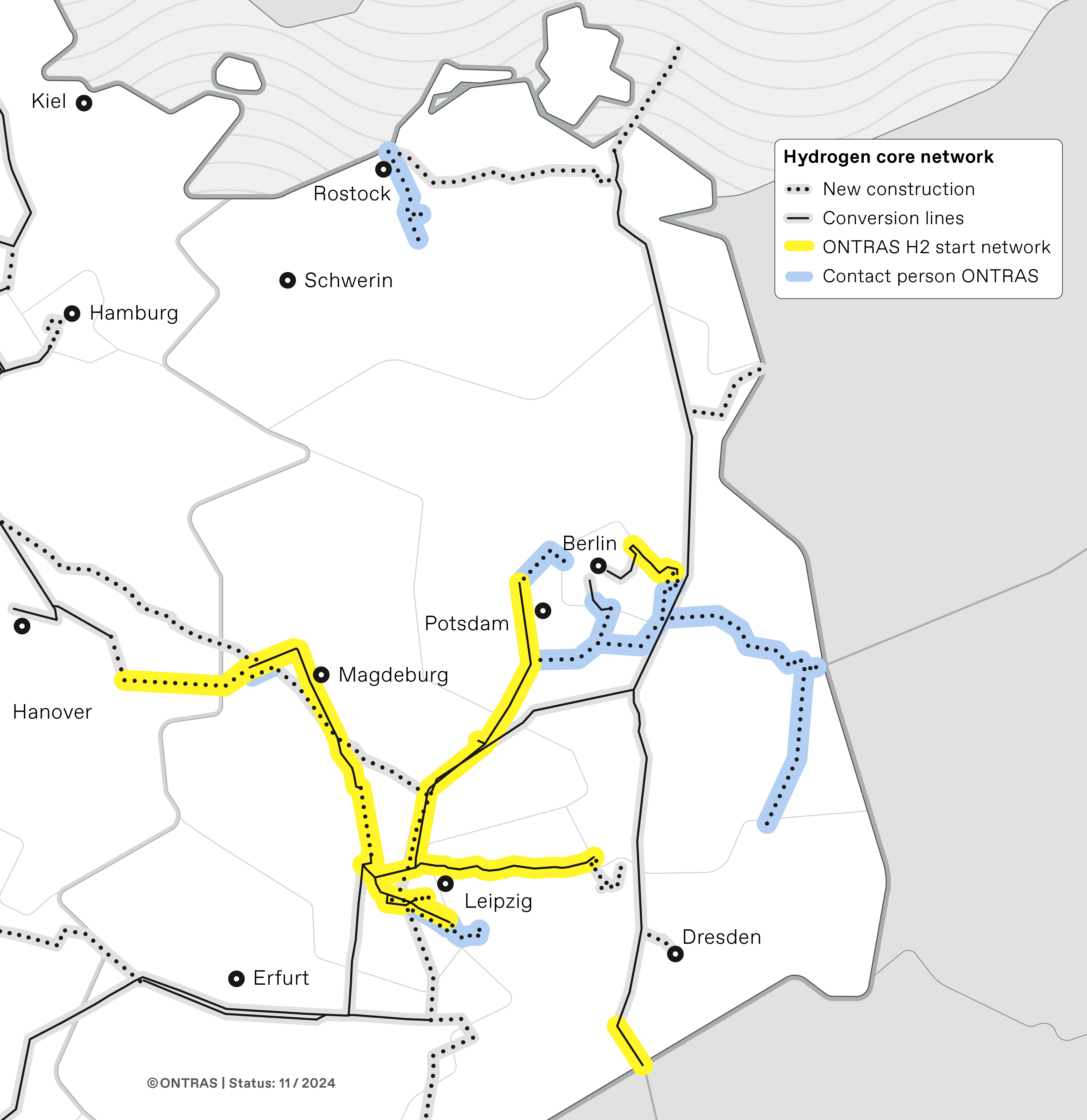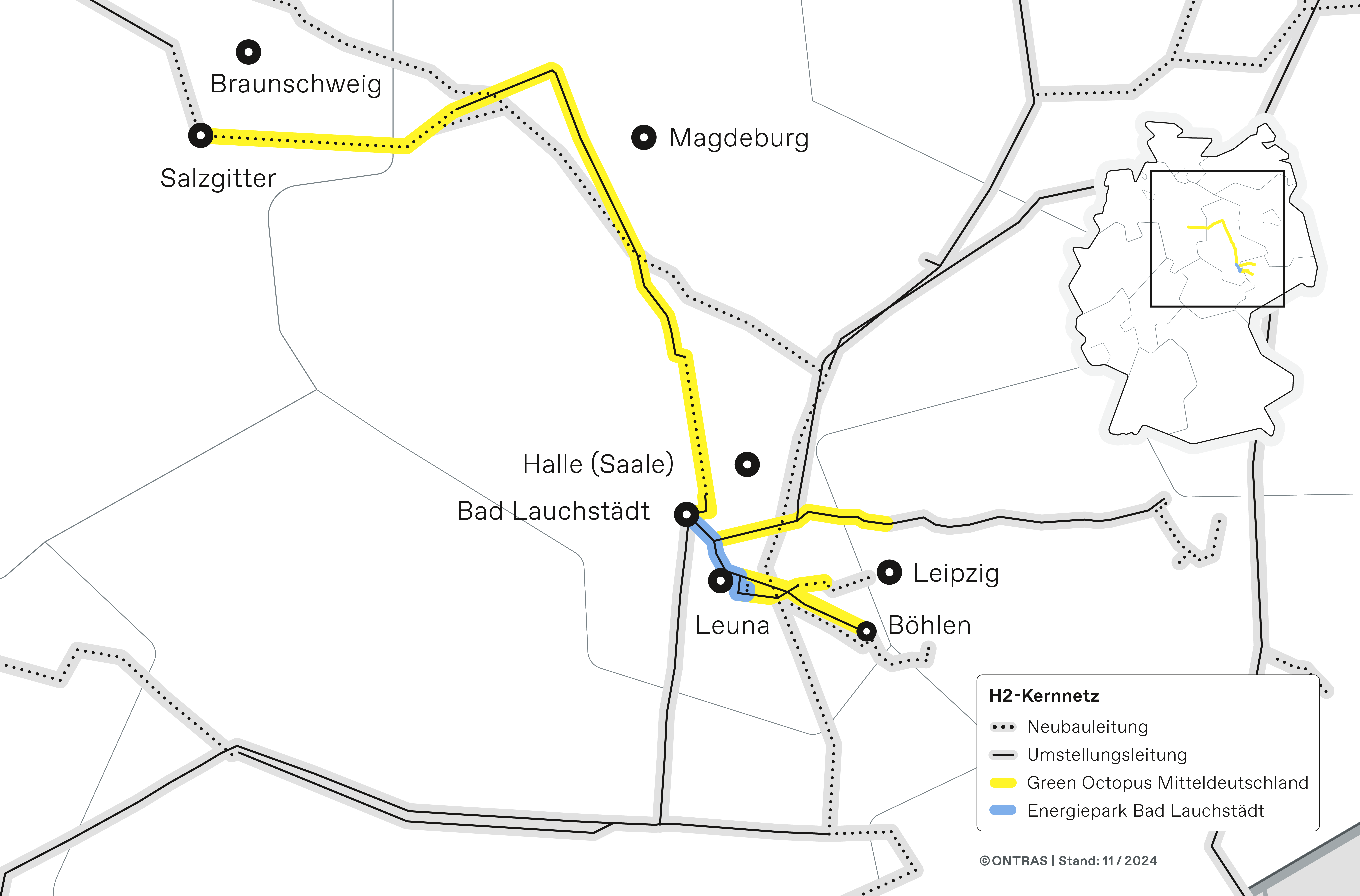ONTRAS H2 start network
Hydrogen infrastructure for eastern and central Germany
The development of a functioning hydrogen economy is fundamental to achieving the climate targets. By transforming our infrastructure towards hydrogen, we are actively shaping a climate-neutral future. With our expertise in gas transportation and experience in the construction and operation of long-distance gas pipelines and plants, we are the right people to help build the hydrogen network in Germany right from the start.
Hydrogen core network: future transportation infrastructure in Germany
Hydrogen is of central importance on the road to a climate-neutral energy age. From large-scale production to industrial applications, a large number of projects using hydrogen technology are being planned in Germany. With the amendment of the Energy Industry Act in 2023, the German government has initiated the political and regulatory creation of one of the central major infrastructure projects of the energy transition: a Germany-wide hydrogen core network that will gradually connect hydrogen consumption and production hubs as well as storage and import points by 2032. As a transmission system operator, ONTRAS has fully supported and helped shape the development process of the core network from the very beginning and submitted the application for the hydrogen core network together with the other transmission system operators in Germany in July 2024. Approval was granted in October 2024.

Development of the ONTRAS H2 start network in eastern and central Germany
ONTRAS has added a total of around 1,100 kilometers of hydrogen pipelines to the hydrogen core network. With this ONTRAS H2 start network, we are beginning to build a sustainable hydrogen infrastructure in eastern and central Germany. In the first important phase on the way to a nationwide transport infrastructure, we will implement around 600 kilometers of hydrogen pipelines in the coming years. Around 80 percent of these will be created by converting existing gas pipelines, while around 20 percent will be newly built. The two major infrastructure projects Green Octopus Mitteldeutschland (GO!) and doing hydrogen as well as the pipeline section in the Bad Lauchstädt energy park are part of the ONTRAS H2 start network.
Funded by the Federal Ministry for Economic Affairs and Climate Protection as a real-life laboratory for the energy transition, ONTRAS is converting the first 25 kilometers of natural gas pipeline in the Bad Lauchstädt energy park to transport hydrogen by 2025. Furthermore, both the doing hydrogen project and Green Octopus Mitteldeutschland were recognized by the Federal Ministry for Economic Affairs and Climate Protection as important infrastructure projects (IPCEI - Important Projects of Common European Interest) and received the corresponding funding approval in July 2024. Thanks to the approval for the early start of measures, the planning work for both projects could already begin in December 2022 due to their particular importance.

GO! as a central hydrogen transport route for Saxony-Anhalt and Lower Saxony
Green Octopus Central Germany (GO!) is creating the future transport route and storage option for green hydrogen for the Central German chemical triangle and industrial centers in Saxony-Anhalt and neighboring Lower Saxony. With around 300 kilometers of pipelines, GO! will ensure the safe transport of hydrogen between Leuna, the metropolitan regions of Halle-Leipzig and Magdeburg, the Helmstädter Revier and the Salzgitter steel region.
The connection to the Salzgitter industrial region and the pipeline infrastructure anchored in the core network towards the North Sea and Benelux will create a central link that is of strategic importance and, in particular, will ensure the continuous supply of the energy-intensive steel industry - a key sector for the industrial transformation.
Focus on pioneering work: Bad Lauchstädt energy park
The Bad Lauchstädt Energy Park (EBL) is the first and so far only real laboratory of the energy transition under construction with a final investment decision by all partners. It covers the entire value chain for green hydrogen: large-scale production, storage, transportation, marketing and use.
This holistic approach is groundbreaking for the future of energy supply in the region and beyond.
The Bad Lauchstädt energy park is funded by the BMWK as a real laboratory for the energy transition and is the first implementation project of the ONTRAS H2 start network.
The most important milestones of the real laboratory include the signing of the capacity contract for the transport of green hydrogen in December 2023 and the grid connection of the first hydrogen customer in September 2024. ONTRAS will convert a 25 km long natural gas pipeline between Bad Lauchstädt and Leuna to the transport of hydrogen in the near future and will transport hydrogen commercially from the 4th quarter of 2025.
“The FNB's core network is the first, important stage in the development of the German hydrogen infrastructure. We are convinced that with our ONTRAS H2 start network as part of the core network, we will provide a necessary prerequisite for the decarbonization of industry and the economy in eastern and central Germany.”
Further grid expansion as part of integrated grid development planning
The gradual expansion of the core network is the first stage in the development of the German hydrogen infrastructure - which will then move on to the regular process of integrated network development planning. This will pave the way for the further, nationwide expansion of the hydrogen infrastructure in Germany, including at the distribution grid level. The increasingly concrete determination of hydrogen potentials and requirements as part of network development planning will enable the gradual implementation of further pipeline projects in the coming years.

